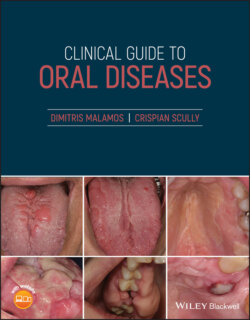Читать книгу Clinical Guide to Oral Diseases - Crispian Scully - Страница 52
Case 4.5
ОглавлениеFigure 4.5
CO: A 46‐year‐old man presented complaining of bad smell and breath over the last one and a half years.
HPC: According to the patient, his bad breath was first noticed during the period of his divorce, and became more severe during the last six months. His halitosis was constant during the day, easily noticed by him but not by his close relatives. At the same time, body odor problems were reported. Both complaints gave him serious concerns about meeting with other people at his job.
PMH: He had no serious medical problems apart from being carcinophobic, as he lost his best friend from a lung carcinoma five years ago. He was not under any medicine uptake and never a smoker or drinker.
OE: Physical examination revealed a healthy middle‐aged man with no obvious respiratory or gastroenterology problems. His mouth was in a good condition, with a complete dentition having a few fillings but no caries, healthy gingivae and absence of serious oral diseases (Figure 4.5). Breathing his exhaled air from his mouth by closing his nose did not reveal bad breath. Smelling common odors did not reveal any disturbances.
Q1 What was the cause of the patient's halitosis?
1 Early morning halitosis
2 Halitophobia
3 Smoking
4 Drug‐induced
5 Inadequate oral hygiene
Answers:
1 No
2 The fear of having bad breath (halitophobia) was the cause, despite that no one else could notice it. This halitosis is present all day, slightly improved during tooth‐brushing or eating chewing‐gum, causing the patient to brush his teeth and chewing‐gum many times during the day.
3 No
4 No
5 No
Comments: All the other causes of bad breath are easily detected by the people close to the patient, but this did not happen in this case. The early morning halitosis appears in healthy patients only in early mornings, but disappears with teeth brushing or eating breakfast. The absence of smoking or drug use together with the patient's good oral hygiene confirms the fear of non‐existing halitosis.
Q2 What other symptoms accompanied this breath disturbance?
1 Metallic taste
2 Burning sensation
3 Sense of xerostomia
4 Stomatodynia
5 Pruritus
Answers:
1 Taste alteration like metallic taste is a common symptom in patients with severe anxiety, and especially in those with halitophobia.
2 Burning sensation is part of the burning mouth syndrome and often appears together with the delusion of bad breath.
3 The sense but not the presence of dry mouth is a common finding in patients under severe stress, depression, and halitophobia.
4 Stomatodynia is a clinical complaint of patients with severe depression and anxiety and sometimes comes together with halitophobia.
5 Pruritus is a chronic itching of the skin of face and body that is caused by a number of factors among which anxiety plays an important role and is sometimes accompanied with halitophobia.
Q3 Which other conditions have been linked with this condition?
1 Hypochondria
2 Brain tumor
3 Obsessive compulsive syndrome
4 Olfactory reference syndrome
5 Parkinson's disease
Answers:
1 Hypochondria is a somatic symptom disorder characterized by a persistent fear of having an undiagnosed disease which sometimes could cause bad breath.
2 No
3 This disorder is characterized by chronic, uncontrollable thoughts (i.e. worry about bad breath or fear of germs) and continuously repeated behaviors.
4 Olfactory reference syndrome is a psychiatric condition which involves a false belief of an existing body odor that is offensive to other individuals.
5 No
Comments: Both Parkinson's disease and brain tumors cause existing and not hallucinated bad breath, as it is easily detected by other people as a result of xerostomia, poor oral hygiene and main treatment side effects (drugs or surgery).
